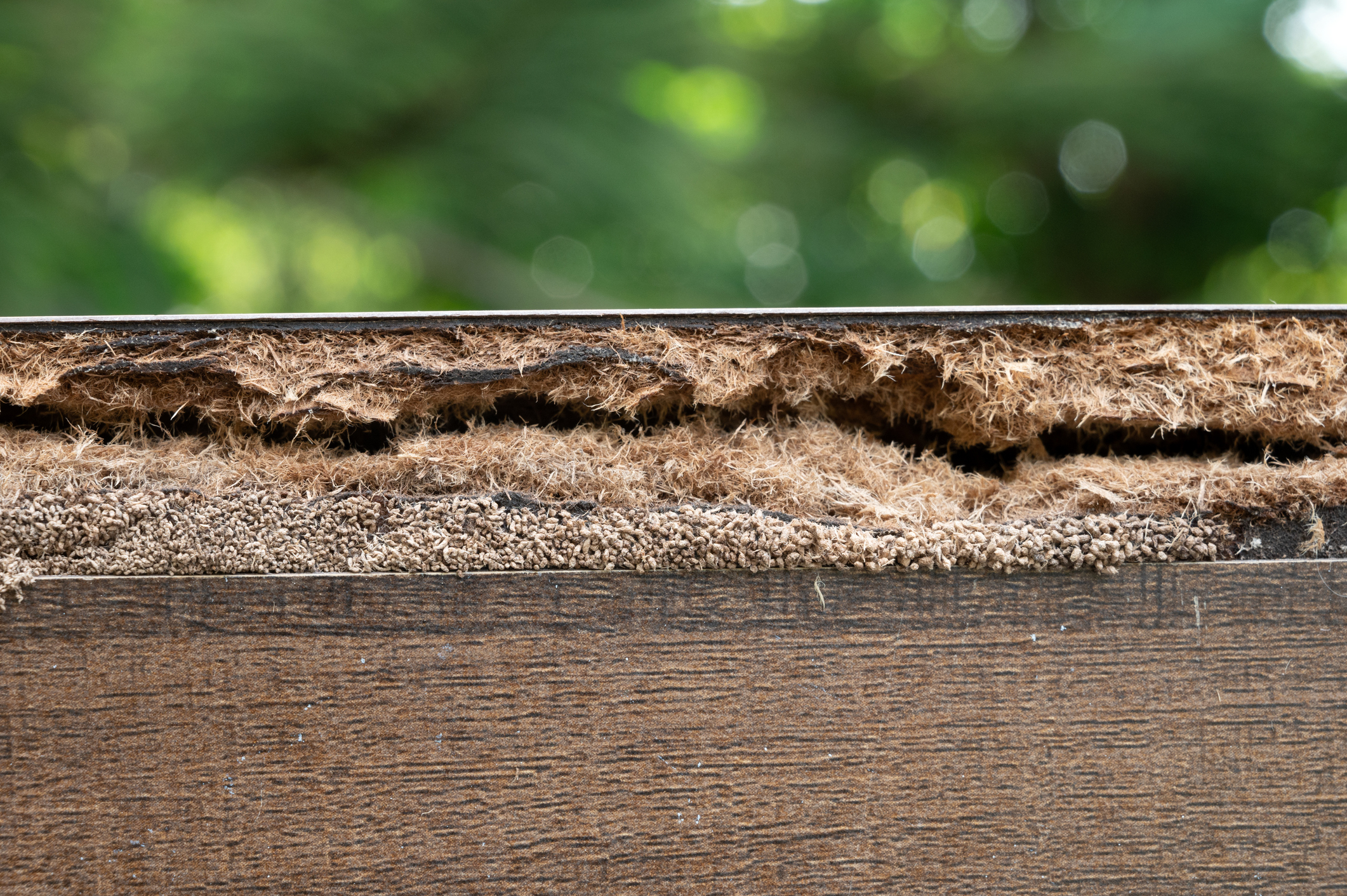8 Surprising Things Your Home Insurance Won't Cover
The only thing more frustrating than an unexpected home repair is finding out it's not actually covered by your insurance. Here's what you need to know to be prepared.

Rachael Green
Profit and prosper with the best of Kiplinger's advice on investing, taxes, retirement, personal finance and much more. Delivered daily. Enter your email in the box and click Sign Me Up.
You are now subscribed
Your newsletter sign-up was successful
Want to add more newsletters?

Delivered daily
Kiplinger Today
Profit and prosper with the best of Kiplinger's advice on investing, taxes, retirement, personal finance and much more delivered daily. Smart money moves start here.

Sent five days a week
Kiplinger A Step Ahead
Get practical help to make better financial decisions in your everyday life, from spending to savings on top deals.

Delivered daily
Kiplinger Closing Bell
Get today's biggest financial and investing headlines delivered to your inbox every day the U.S. stock market is open.

Sent twice a week
Kiplinger Adviser Intel
Financial pros across the country share best practices and fresh tactics to preserve and grow your wealth.

Delivered weekly
Kiplinger Tax Tips
Trim your federal and state tax bills with practical tax-planning and tax-cutting strategies.

Sent twice a week
Kiplinger Retirement Tips
Your twice-a-week guide to planning and enjoying a financially secure and richly rewarding retirement

Sent bimonthly.
Kiplinger Adviser Angle
Insights for advisers, wealth managers and other financial professionals.

Sent twice a week
Kiplinger Investing Weekly
Your twice-a-week roundup of promising stocks, funds, companies and industries you should consider, ones you should avoid, and why.

Sent weekly for six weeks
Kiplinger Invest for Retirement
Your step-by-step six-part series on how to invest for retirement, from devising a successful strategy to exactly which investments to choose.
Buying home insurance is supposed to mean you're covered when disaster strikes — and in many ways, it does. But there are some surprising exclusions in standard policies that could leave your home exposed to uncovered damage.
If you live in a flood-prone area, for example, you might need to double-check your coverage and buy additional flood insurance to cover the gaps. Such natural disasters typically aren't covered by standard home insurance. Yet, the number of homes with flood insurance in the United States fell to just 3.3% last year.
There are a number of potential damages or liabilities from which a standard home insurance policy doesn't protect you. Here are some of the most common ones that are excluded, even if they sound like they would be covered.
From just $107.88 $24.99 for Kiplinger Personal Finance
Become a smarter, better informed investor. Subscribe from just $107.88 $24.99, plus get up to 4 Special Issues

Sign up for Kiplinger’s Free Newsletters
Profit and prosper with the best of expert advice on investing, taxes, retirement, personal finance and more - straight to your e-mail.
Profit and prosper with the best of expert advice - straight to your e-mail.
1. Flood damage
A standard home insurance policy does not cover damage from a flood. This exclusion is tricky because it includes water damage that occurs during a hurricane or other storm, but is deemed flood-related rather than wind or rain-related.
If your home is located in a special flood hazard area (SFHA), your mortgage lender will likely require you to purchase flood insurance from the federal government's National Flood Insurance Program or from a private insurer.
Even if you aren't in a flood zone or aren't required to get flood insurance, it's still good to have. Flooding is involved in 90% of natural disasters in the U.S. Even if the natural disaster is covered by your standard policy, any flooding related to it won't be.
Flood insurance typically costs an average of about $888 per year, according to a Policy Genius report. But premiums vary depending on your property's elevation and other flood risk factors. You can get price quotes at FloodSmart.gov.
2. Earthquakes, landslides and sinkholes

As surprising as it sounds, home insurance doesn't cover damage that results from land movements, including earthquakes, landslides or sinkholes.
For those who live in areas where any of these are a real risk, additional earthquake insurance is recommended. That's particularly true for people who live in California, Washington and Missouri, the top three earthquake markets in the country, as identified by the Federal Emergency Management Agency (FEMA).
Californians can purchase a policy through the California Earthquake Authority.
It is also possible to purchase an additional policy or add coverage for landslides or sinkholes if you're at risk.
3. Water leaks are only covered in some situations

Home insurance does cover damage resulting from water leaks, but only when the leak is sudden or accidental, such as if a pipe burst.
Insurance does not cover damage from leaks that are a result of poor maintenance on the part of the homeowner; for example, if a homeowner fails to remedy a slow leak that causes damage over time.
To prevent being denied coverage for a water leak, check your roof and plumbing regularly for damage — especially after a storm or natural disaster. You want to catch every sudden or accidental break when it happens so you can make a prompt claim if necessary. If you don't notice a leak until months later and make a claim at that point, your insurer might decide it's the result of poor maintenance.
4. Mold coverage is tricky
Mold is not usually covered by a home insurance policy unless you can prove it has sprung up as a result of a "covered peril," such as a water heater bursting or wind-driven rain. Say a hurricane rips a hole in your roof, causing rainwater to soak through your ceiling and walls. If mold grows in that area, insurance will likely cover it.
However, if the cause of the mold is a flood or other excluded disaster, you're on your own. Mold is also not covered if it was caused by neglect, such as, say, failing to deal with a leaking pipe under the kitchen sink for months, which results in mold growth.
Even if the mold is caused by a "covered peril," you still need to take proactive steps to prevent mold from growing to improve your odds of getting the mold claim approved.
If a pipe bursts, for example, you need to shut off water to your house, take photos of the damage, then dry the area as quickly as you can. If your insurer determines that you didn't make every reasonable effort to prevent mold, your mold claim might be denied even if other damage is covered.
5. Expensive jewelry and other valuables aren't fully covered
While your personal property is usually covered by home insurance, home insurance will typically have limits that cap the maximum payout for certain types of property. For particularly valuable possessions such as jewelry, art and collectibles, that coverage limit won't reflect the full value of the items.
For example, if your policy has a limit of $1,500 for jewelry, that's the maximum amount you could receive from insurance if your jewelry is stolen or damaged — even if you can prove your jewelry collection was worth more than that.
To ensure these valuable items for their full value, you'll need to have them professionally appraised and pay extra to add a personal property endorsement or rider to your insurance policy. Rates can vary between providers, but you can expect to pay about 1% to 2% of your item's value, according to Geico. For example, a $5,000 engagement ring could cost about $50 annually to insure.
6. Home office equipment isn't fully covered
Do you work from home? A typical home insurance policy provides only $2,500 of coverage for business equipment, the Insurance Information Institute reports.
Depending on your business, you might have equipment or inventory worth far more than that. Fortunately, for as little as $20 a year, you could add a home business endorsement or rider that doubles your policy's coverage from $2,500 to $5,000.
7. Pest damage is your responsibility

Whether it's termites burrowing through your framing or rodents chewing up your wiring, most pest damage isn't actually covered by home insurance. You'll be liable to pay for repairing the damage and removing the offending pest.
The reason: Infestations are typically seen as preventable through proper home maintenance. Any damage caused is deemed the result of negligence or poor maintenance.
There are some exceptions to this exclusion. For example, large animals such as deer or bears that smash your fence or break into your home would likely be covered.
Some insurers will also step in for a "covered peril" that results from pest damage. Say the rats that chewed through your wiring started an electrical fire. Your insurer would likely cover any fire-related damage. But you'd still be on the hook for any rodent-related damage.
8. Recent home upgrades might not be covered
If you've done any remodeling or modifications to your home, like adding a wheelchair ramp or finishing your basement, it might not be covered by your current home insurance policy.
Your policy covers your home as it was when you enrolled. If you've made home upgrades since then, especially ones that would be expensive to replace or repair, you need to contact your insurer to make sure you have enough coverage to pay for them.
4 types of damage home insurance will cover
If home insurance won't kick in for any of the eight types of damage above, what is it good for? Fortunately, there are still plenty of situations in which your coverage will apply. The key is to make sure you know which types of disasters are included and how the coverage you have works.
To understand the nuances of your coverage, take a look at some things that are included in most standard home insurance policies.
1. Some natural disasters are covered by home insurance
Most policies cover damage to your home from natural disasters such as tornados, hurricanes, lightning, snowstorms and fires. They also cover damage to detached structures located on your property, such as a shed, garage, fence or gazebo.
2. The contents of your home are (mostly) protected
Home insurance policies typically cover the contents of your home from damage or theft. In most cases, this coverage comes in the form of a maximum dollar amount that your insurer will pay for lost or damaged personal property.
But keep in mind, you need to provide evidence of your belongings to your insurance provider when you file a claim. If you can't prove you owned an item or you can't prove the actual value of it, insurance might not be willing to pay out.
(Pro tip: Take pictures of your possessions and store those photos in the cloud so that you're prepared to make a claim.)
3. Short-term living expenses are often covered
If a covered disaster makes your home unlivable, standard home insurance will usually cover the temporary living expenses you incur while waiting for your home to be repaired or rebuilt.
This coverage pays for short-term living expenses, such as hotel bills, meals and other expenses listed in your policy, while your home is being rebuilt after a disaster. Doublecheck the terms of your policy, though. Some plans will only cover these expenses for a certain time frame or up to a certain dollar amount.
Insurers also vary on how this benefit is paid out. Some might send you a debit card in the mail right away. Others might have to pay for things out of pocket and submit the receipts for reimbursement.
4. Home insurance protects you against lawsuits for injury or property damage
Standard home insurance provides liability protection against lawsuits for bodily injury or property damage that you or your family members cause to other people when they're on your property. This protection pays for attorney fees and any court-ordered payouts to the injured party up to your policy's limit.
However, it's important to re-evaluate your liability coverage periodically to make sure it's enough. As your net worth grows, the maximum liability coverage your home insurance will offer might not be enough to fully protect your finances.
When that happens, you can look into umbrella insurance to fill in the gaps. Umbrella insurance provides additional liability coverage to make sure your finances will be fully shielded in any lawsuit.
Related Content
Profit and prosper with the best of Kiplinger's advice on investing, taxes, retirement, personal finance and much more. Delivered daily. Enter your email in the box and click Sign Me Up.

Alexandra is Kiplinger.com's senior retirement editor. A financial news journalist with more than 20 years of experience, Alexandra has covered stock markets, the economy, wealth management and personal finance. She has previously written/edited for CNNMoney, Institutional Investor, and Investopedia, among others. She holds a bachelor's degree in communications from the University of Michigan.
- Rachael GreenPersonal finance eCommerce writer
-
 Dow Adds 1,206 Points to Top 50,000: Stock Market Today
Dow Adds 1,206 Points to Top 50,000: Stock Market TodayThe S&P 500 and Nasdaq also had strong finishes to a volatile week, with beaten-down tech stocks outperforming.
-
 Ask the Tax Editor: Federal Income Tax Deductions
Ask the Tax Editor: Federal Income Tax DeductionsAsk the Editor In this week's Ask the Editor Q&A, Joy Taylor answers questions on federal income tax deductions
-
 States With No-Fault Car Insurance Laws (and How No-Fault Car Insurance Works)
States With No-Fault Car Insurance Laws (and How No-Fault Car Insurance Works)A breakdown of the confusing rules around no-fault car insurance in every state where it exists.
-
 No-Fault Car Insurance States and What Drivers Need to Know
No-Fault Car Insurance States and What Drivers Need to KnowA breakdown of the confusing rules around no-fault car insurance in every state where it exists.
-
 7 Frugal Habits to Keep Even When You're Rich
7 Frugal Habits to Keep Even When You're RichSome frugal habits are worth it, no matter what tax bracket you're in.
-
 How Much It Costs to Host a Super Bowl Party in 2026
How Much It Costs to Host a Super Bowl Party in 2026Hosting a Super Bowl party in 2026 could cost you. Here's a breakdown of food, drink and entertainment costs — plus ways to save.
-
 3 Reasons to Use a 5-Year CD As You Approach Retirement
3 Reasons to Use a 5-Year CD As You Approach RetirementA five-year CD can help you reach other milestones as you approach retirement.
-
 How to Watch the 2026 Winter Olympics Without Overpaying
How to Watch the 2026 Winter Olympics Without OverpayingHere’s how to stream the 2026 Winter Olympics live, including low-cost viewing options, Peacock access and ways to catch your favorite athletes and events from anywhere.
-
 Here’s How to Stream the Super Bowl for Less
Here’s How to Stream the Super Bowl for LessWe'll show you the least expensive ways to stream football's biggest event.
-
 The Cost of Leaving Your Money in a Low-Rate Account
The Cost of Leaving Your Money in a Low-Rate AccountWhy parking your cash in low-yield accounts could be costing you, and smarter alternatives that preserve liquidity while boosting returns.
-
 This Is How You Can Land a Job You'll Love
This Is How You Can Land a Job You'll Love"Work How You Are Wired" leads job seekers on a journey of self-discovery that could help them snag the job of their dreams.